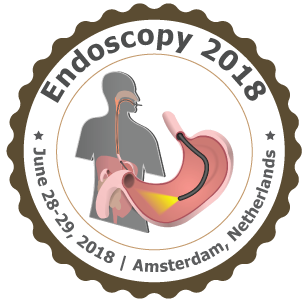12th International Conference on Abdominal Imaging and Endoscopy
Amsterdam, Netherlands

Hideaki Kawabata
Kyoto Okamoto Memorial Hospital, Japan
Title: Percutaneous intraductal ultrasonography as a local assessment before magnetic compression anastomosis for obstructed choledocho-jejunostomy
Biography
Biography: Hideaki Kawabata
Abstract
Magnetic compression anastomosis (MCA) has been developed as a non-surgical alternative treatment for biliary obstruction without serious complications. A 70-year-old woman who had undergone pancreaticoduodenectomy with modified Child reconstruction for pancreatic head cancer suffered from obstructed choledocho-jejunostomy with no recurrent findings four months after the operation. Cholangiography using the percutaneous transhepatic cholangiographic drainage (PTCD) and fluoroscopy revealed complete obstruction of the upper common bile duct, and the distance of the obstruction was 7 mm. Intraductal ultrasonography (IDUS) showed fibrous heterogenous hyperechoic appearance without fluid collection, vessels or foreign bodies at the site of the obstruction. We performed choledocho-jejunostomy using the MCA technique. One magnet was inserted into the obstruction of the hepatic side through the PTCD fistula. Another was delivered endoscopically to the obstruction of the jejunal side. The two magnets were immediately attracted towards each other transmurally, and reanastomosis was confirmed 7 days after starting the compression. The magnets were easily retrieved endoscopically. A 16-Fr indwelling drainage tube was placed in the juodenum through the PTCD. The internal tube is still in place ten months after reanastomosis, and no MCA-related complications have been observed. In conclusion, MCA is a safe, effective, low-invasive treatment for biliary obstruction, and IDUS is useful for the pretreatment assessment of feasibility and safety.

